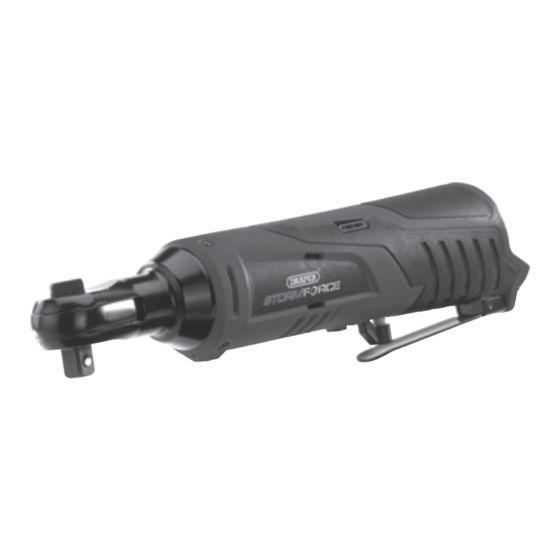Draper 17135 Instructions pour - Page 12
Parcourez en ligne ou téléchargez le pdf Instructions pour pour {nom_de_la_catégorie} Draper 17135. Draper 17135 20 pages. 10.8v cordless ratchet - bare
Également pour Draper 17135 : Manuel d'instructions (20 pages)

9.
BASIC RECIPROCATING SAW OPERATION
9.1 SWITCH AND VARIABLE STROKE
RATE CONTROL - FIG. 5
Your reciprocating saw is equipped with a trigger
switch to turn the saw on and off, and to control
the speed.
-
To start the saw, press the trigger switch
-
To stop the saw, release the trigger switch.
-
To vary the stroke rate, simply increase or
decrease the pressure on the trigger switch.
The tighter the trigger switch is pressed, the
higher the speed.
9.2 GENERAL CUTTING
WARNING: Before use, always check to see that the trigger is actuated properly and returns
to the off position when released.
WARNING: When sawing into walls or floors you may encounter electrical wiring. Sawing
into a "live" wire will cause electric shock. Always check with a metal/voltage detector that
there are no hidden hazards such as electrical cables, water or gas pipes running below the
surface.
-
Make sure the workpiece is firmly anchored. Clamp the workpiece to prevent slipping or
moving while cutting.
-
Use the appropriate type and size of blade for the workpiece material and size.
-
Check for clearance beyond the workpiece so the blade will not impact another surface.
-
Mark the line of cut clearly. If cutting metal, apply cutting oil on the line.
-
Depress the trigger switch to start the saw and bring it to maximum desired cutting
stroke rate before applying the blade to the workpiece.
-
Do not force the tool. Place the shoe firmly on the workpiece while cutting. Use only
enough steady pressure on the blade to keep the saw cutting. Reduce pressure as the
blade comes to the end of the cut.
-
Cutting stroke rates should vary with the workpiece. Hard materials such as metals
require lower stroke rates, for softer materials use higher stroke rates.
-
Check wood, chip boards, building materials etc. for foreign objects (nails, screws, etc.)
before sawing and remove them, if necessary.
-
Position the pivoting footplate onto the surface of the work and saw through the work
applying uniform contact pressure of feed.
If the saw blade jams, switch off the tool immediately. Widen the saw cut with a suitable
tool and pull out the saw blade.
12
.
FIG.5
